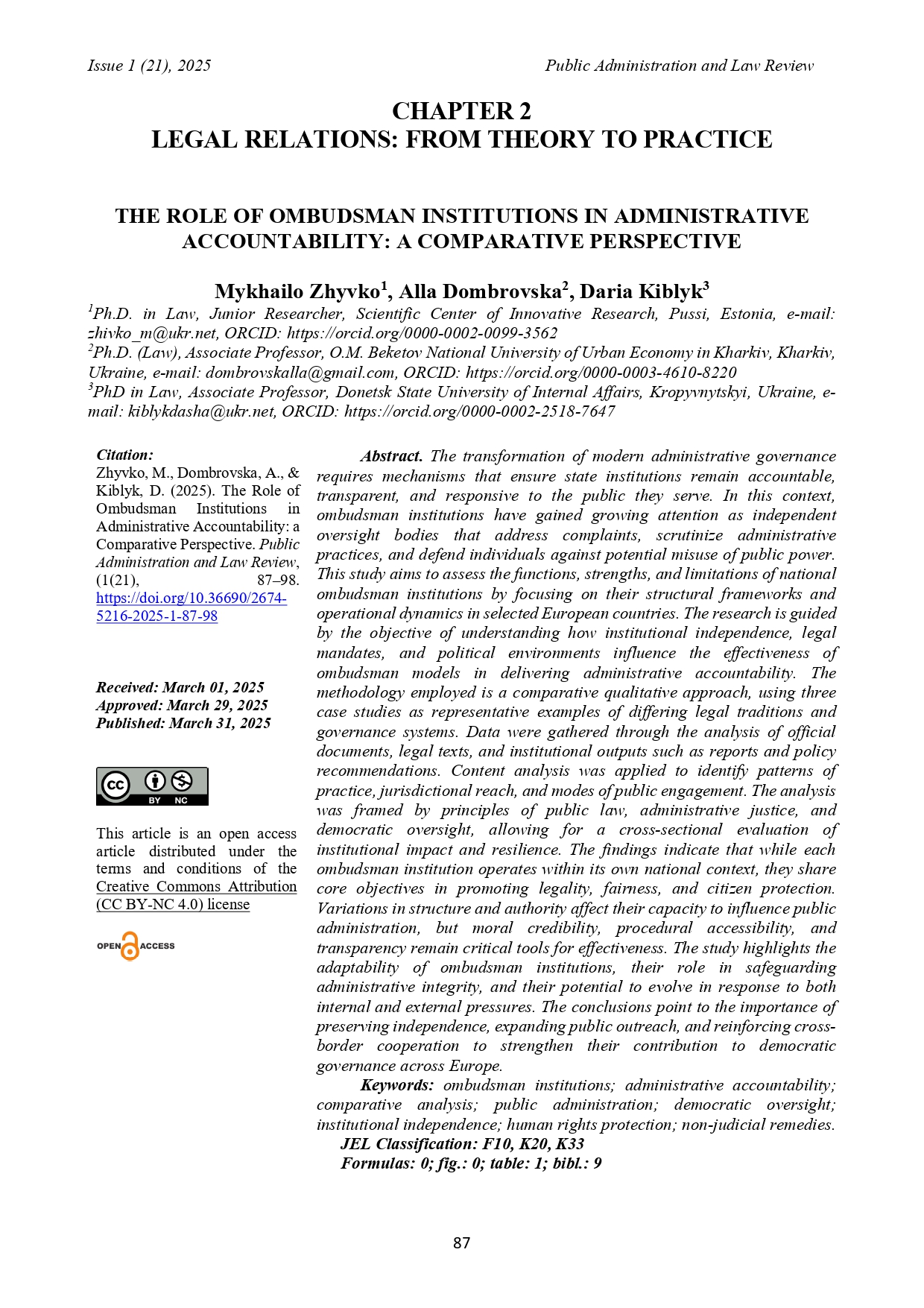THE ROLE OF OMBUDSMAN INSTITUTIONS IN ADMINISTRATIVE ACCOUNTABILITY: A COMPARATIVE PERSPECTIVE
DOI:
https://doi.org/10.36690/2674-5216-2025-1-87-98Keywords:
ombudsman institutions, administrative accountability, comparative analysis, public administration, democratic oversight, institutional independence, human rights protection, non-judicial remediesAbstract
The transformation of modern administrative governance requires mechanisms that ensure state institutions remain accountable, transparent, and responsive to the public they serve. In this context, ombudsman institutions have gained growing attention as independent oversight bodies that address complaints, scrutinize administrative practices, and defend individuals against potential misuse of public power. This study aims to assess the functions, strengths, and limitations of national ombudsman institutions by focusing on their structural frameworks and operational dynamics in selected European countries. The research is guided by the objective of understanding how institutional independence, legal mandates, and political environments influence the effectiveness of ombudsman models in delivering administrative accountability. The methodology employed is a comparative qualitative approach, using three case studies as representative examples of differing legal traditions and governance systems. Data were gathered through the analysis of official documents, legal texts, and institutional outputs such as reports and policy recommendations. Content analysis was applied to identify patterns of practice, jurisdictional reach, and modes of public engagement. The analysis was framed by principles of public law, administrative justice, and democratic oversight, allowing for a cross-sectional evaluation of institutional impact and resilience. The findings indicate that while each ombudsman institution operates within its own national context, they share core objectives in promoting legality, fairness, and citizen protection. Variations in structure and authority affect their capacity to influence public administration, but moral credibility, procedural accessibility, and transparency remain critical tools for effectiveness. The study highlights the adaptability of ombudsman institutions, their role in safeguarding administrative integrity, and their potential to evolve in response to both internal and external pressures. The conclusions point to the importance of preserving independence, expanding public outreach, and reinforcing cross-border cooperation to strengthen their contribution to democratic governance across Europe.
Downloads
References
European Ombudsman. (2022). Annual Report 2021. Retrieved from https://www.ombudsman.europa.eu
Gregory, R., & Giddings, P. (2000). Righting Wrongs: The Ombudsman in Six Continents. Amsterdam: IOS Press.
International Ombudsman Institute (IOI). (2020). Global Standards and Best Practices for Ombudsman Institutions.Vienna: IOI Publications.
Lechevin, A. (2017). The role of the Défenseur des droits in protecting rights and freedoms in France. Revue Française d’Administration Publique, 163(3), 563–578. https://doi.org/10.3917/rfap.163.0563
Magnette, P. (2003). Between parliamentary control and the rule of law: The political role of the European Ombudsman. Journal of European Public Policy, 10(5), 677–694. https://doi.org/10.1080/1350176032000124070
Reif, L. C. (2004). The Ombudsman, Good Governance, and the International Human Rights System. Leiden: Martinus Nijhoff Publishers.
Sadurski, W. (2019). Poland's Constitutional Breakdown. Oxford: Oxford University Press.
Smilov, D. (2010). The ombudsman institution and democratic consolidation in Eastern Europe. East European Constitutional Review, 9(2), 54–62.
Stenshed, B. (2011). The Swedish Ombudsman: A historical and comparative perspective. In IOI (Ed.), Ombudsman Institutions: Strengthening the Rule of Law and Human Rights (pp. 21–33). Vienna: IOI Publications.

Downloads
Published
How to Cite
Issue
Section
License

This work is licensed under a Creative Commons Attribution-NoDerivatives 4.0 International License.





